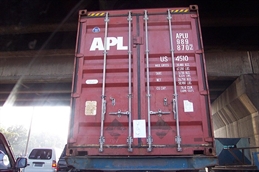
Sources have moved on a report outlining new initiatives to build a world class port network in Indonesia.
These were outlined by Hans Patuwo and Robert Carey, Partners at McKinsey and Company in an opinion piece for the Jakarta Post.
Improving domestic port operations and procedures – their first suggestion – is one of the “simplest and most effective ways to encourage a maritime transformation across Indonesia,” they argued.
This improvement, though, might be the hardest thing to do as it would require both a change of mindset and plenty of new port hardware goodies.
“There are so many stakeholders involved in the process of port transformation,” Henry Sandee, senior trade specialist with the World Bank in Jakarta, told Asia Cargo News.
“Plans to upgrade port performance and the status of the various initiatives are not clear. The newly-established coordinating minister for maritime affairs may be a step in the right direction to achieve more coordination,” he added.
One ticklish issue that remains unresolved – and therefore a constraint to further increases in port productivity – is the unclear division of tasks between port authorities and terminal operators. “In this area, the reform agenda needs to be strengthened,” Sandee said.
Another problem is the sheer lack of hardware; getting goods in and out of ports, both water- and landside, is a real problem.
For example, channel and road access in some Indonesian ports are still inadequate and create difficulties for exporters and importers as well as for shipping lines. This impacts efficiency and increases the overall logistics cost, says Jakob Friis Sorensen, president director of Maersk Line Indonesia.
A more candid view comes from a shipping line that spoke to Asia Cargo News on condition of anonymity. A representative notes that while the Port of Jakarta boasts good vessel turnaround time and productivity, the port also suffers from “rather expensive” stevedoring, especially considering the lower cost elsewhere in Asia, and very tight berth availability.
“Vessels that missed their berth windows will be delayed by minimum 48 hours before being allocated next berth,” the official said.
(Patuwo and Carey offered their own solution for this in their column: Fines should be imposed on ships that do not keep their allotted slot, as well as on the port if a schedule is not kept. “This would cut waiting times for ships at port and make a radical difference,” they wrote.)
Other concerns the shipping line flagged were yard congestion caused by long box dwelling times, heavy bottlenecks at terminal entry and exit gates and traffic delays and congestion between industry areas and the port.
There are a number of strategies shipping lines have to deal with this such as switching terminals. “We are adapting with the situation and limitations in different ports and carefully considering the type and size of vessels to deploy. We are closely monitoring the port developments in Jakarta and Surabaya, to assess the possibility for us to upsize our ships,” added Sorensen.
To reduce congestion at Tanjung Priok port, Maersk is using the Cikarang Dry Port terminal for shipments near the Cikarang industrial area east of Jakarta, he added.
Another key (double) reform advocated by Patuwo and Carey is investing in Indonesia’s domestic ports, especially in the growing cities outside Java, Indonesia’s main island and effective logistical hub. This, they acknowledge, will require increased regulatory support and clarity in order to attract the needed money.
To some extent, this is already happening. Plans are underway to build a new integrated port and industrial estate in Surabaya as well as a new container port in Jakarta to help ease the congestion at Tanjung Priok. The new Kalibaru port aims to open the first of its three new terminals in the middle of next year, which will offer a deeper draft.
“There’s still an uneven focus between development of ports in west and east Indonesia, with more emphasis placed on the west,” said Soresen. “This will be a task for the new government to look into.”
Maersk is already doing its bit and is shipping from eastern Indonesia at Bitung; it is the first overseas shipping service to call at Bitung port, said Sorensen. The line offers service to its main transshipment hub at the Port of Tanjung Pelepas in Johor, Malaysia.
“We see opportunities in increasing exports out of the eastern part of Indonesia and want to support the development of this area with a direct service to our main transshipment hub, connecting exporters to global markets,” he said.
By Michael Mackey
Southeast Asia Correspondent | Bangkok



